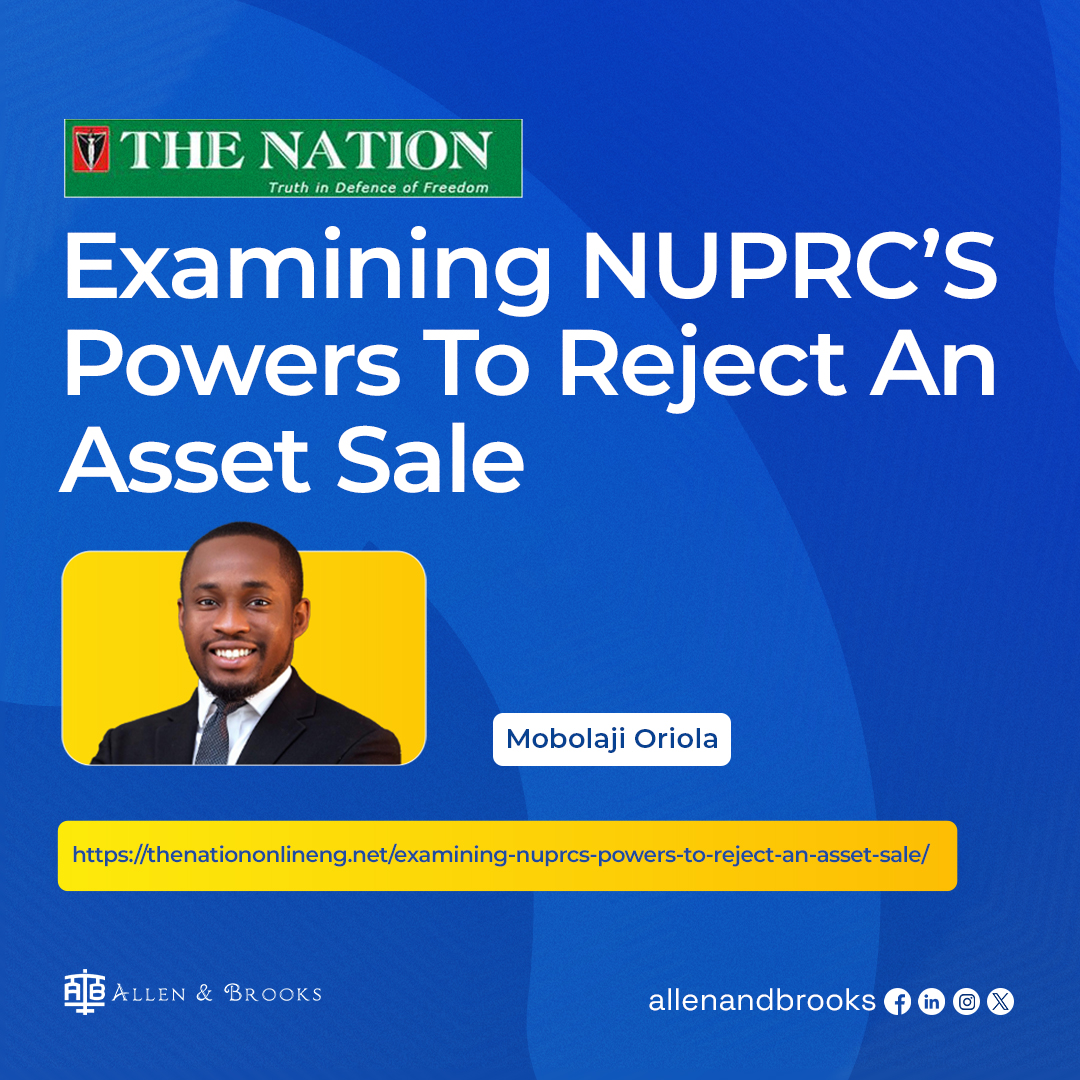
Examining NUPRC’S Powers To Reject An Asset Sale
On August 26, 2024, several media outlets reported that the Nigerian Upstream Petroleum Regulatory Commission (NUPRC) had rejected Shell’s $1.3 billion onshore asset sale to Renaissance.
Renaissance is a consortium consisting of ND Western Ltd, Aradel Holdings Plc, the Petrolin Group, First Exploration and Development Company Limited, and the Waltersmith Group. Some reports have suggested that the transaction was not an asset sale but rather a transfer of shares. This article will not delve into the specifics of the Shell-NUPRC-Renaissance situation, but will instead focus on examining the NUPRC’s authority to reject an asset sale.
NUPRC plays a crucial role in the regulation of the oil and gas sector, which includes overseeing the transfer of assets within the industry.
The Petroleum Industry Act (PIA) 2021, provided for the establishment of NUPRC, as it endows the Commission with significant powers to approve or reject asset sales, a function that is central to maintaining the integrity and strategic direction of Nigeria’s petroleum sector.
The PIA empowers the NUPRC to evaluate certain factors rigorously, giving the Commission the ability to reject transactions that do not meet the stringent criteria set out in the legislation, as its mandate is to ensure that all sales or transfers of petroleum assets are in alignment with Nigeria’s broader national interests.
This includes considerations of energy security, maximising revenue, and ensuring that the country retains control over its strategic resources.
It is also important to emphasise the PIA’s requirement for ministerial consent in asset sales as this oversight promotes transparency, prevents unregulated asset transfers, and ensures acquiring entities are capable of safeguarding the sector’s integrity and economic stability.
Section 95(5) of the PIA provides: “Notwithstanding the provisions of subsection (1), a holder of a license or lease may by way of security, wholly or partly assign, pledge, mortgage, charge or hypothecate its interest under the applicable license, lease or grant a security interest in respect of the interest, provided that the consent of the Commission shall be obtained.”
However, Section 95(1) of the PIA also extends the powers to the Minister of Petroleum Resources as it provides that “a holder of a petroleum prospecting license or petroleum mining lease shall not assign, novate or transfer his license or lease or any right, power or interest, or a shareholder of an incorporated joint venture shall not sell or transfer its shares without prior written consent of the Minister”.
Certain conditions must be met to receive ministerial consent for the transaction discussed herein.
Section 95(11) provides: “The minister may grant consent to an assignment, novation or transfer of a petroleum prospecting license or petroleum mining lease, subject to the following terms and conditions which the Commission may consider appropriate, that the proposed transferee
a. is a company incorporated in Nigeria
b. is of good reputation
c. has sufficient technical knowledge, experience and financial resources to enable it effectively carry out all responsibilities of a licensee or lessee under the license or lease
d. shall comply with the Federal Competition and Consumer Protection Act.”
It is also of considerable importance to consider the provisions of Section 95(12) as it relates to fees.
It provides: “The Commission shall make regulation to prescribe for payment of fees as a condition for any transaction under Subsection (1), which fee shall be based on a percentage of the value of the transaction and shall not be tax deductible.”
Consequent upon the above and where an application for consent has been rejected or denied, Section 95(10) provides: “Where the application for an assignment or a transfer of a petroleum prospecting license or petroleum mining lease is refused, the Commission shall inform the applicant of the reasons for the refusal and may give reasonable time within which further representations may be made by the applicant or by third parties in respect of the application”.
This ensures that the applicant is informed and also given the opportunity to address concerns that may have led to the refusal of the Commission to consent to such a transaction.
There is the need to then understand what constitutes a transfer or change of control that may require the application of Section 95(1) and Section 95(5) as elucidated above.
Section 95(14) provides: “For the purpose of this section, ‘change of control’ means any person or persons acting jointly or in concert, to acquire direct or indirect beneficial ownership of a percentage of the voting power of the outstanding voting securities of the holder, by contract or otherwise, that exceeds 50 per cent at any time.”
On the nuances and dialects of the distinction between a transfer of interest in an asset or transfer of shares, Section 95(4) addresses same as it states that: “A licensee or lessee wishing to assign, novate or otherwise transfer its interest, or a shareholder of an incorporated joint venture wishing to sell or transfer its shares under the subsection (1), shall make an application for approval of the transfer to the Commission in the format prescribed by the Commission, and be accompanied with any other information that may be pursuant to any regulations published by the Commission.”
In conclusion, the PIA grants the NUPRC powers to stipulate the format and regulations for a licensee or lessee to follow before giving its consent.
However, the buck doesn’t stop at the NUPRC’s desk. There is a need to seek consent from the Minister of Petroleum Resources upon the recommendation of the Commission as contained under the provisions of Section 95(2).
Furthermore, there is the Guidelines and Procedures for Obtaining Minister’s Consent to the Assignment of Interest in Oil and Gas Assets, 2021 which further stipulates the procedure for seeking Ministerial consent for such transfer.
SOURCE: The Nation Newspapers
